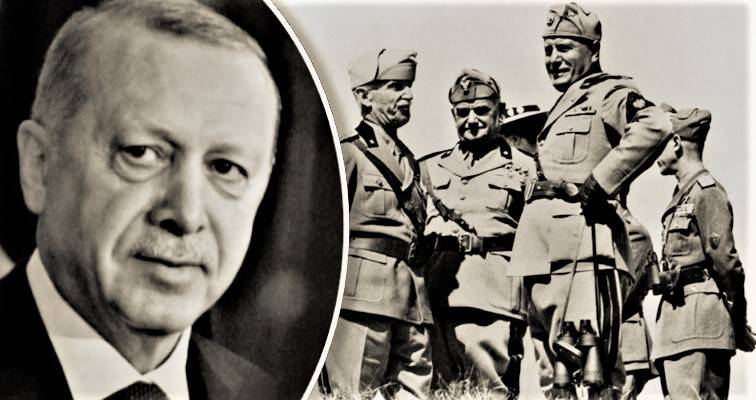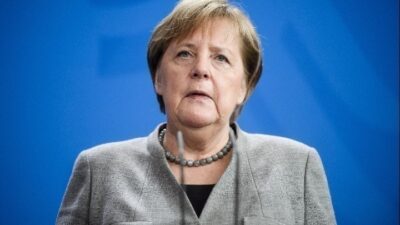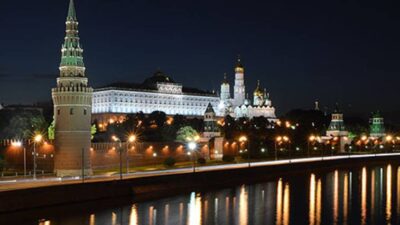Vaggelis Georgiou: History has a lot to teach about Turkey and sanctions
26/12/2020
Many years ago, in the 1930s, there was a government that methodically strengthened its army by claiming the territories of other states. The international community, inactive, saw where the situation was going. The result was that the aggressive state released tons of chemical gases, exterminating hundreds of thousands of citizens of a state it eventually conquered. It was too late for the international community to impose sanctions.
Through selected sanction databases of the last 100 years, we can predict the damage that will accrue from the EU refusal to place sanctions on Turkey. The aggressive country of the 1930s was Italy. The fascist plan to create a powerful empire included faraway Ethiopia, which was invaded by the Italian army and in which invasion killed some 300,000 people!
While the League of Nations saw the unfolding drama, it did nothing to prevent it. So when Italy invaded Ethiopia in 1935, the League of Nations imposed sanctions that proved to be completely inadequate and thus Ethiopia remained an occupied country. Of course, Italy has become a catalytic player, bringing a lot of suffering to humanity. But Mussolini’s example is being followed by the Turks 80 years later.
Taking data from the sanction database from 1950 to 2016, launched and updated by the Drexel University School of Economics, we see that only 1 in 3 sanctions have achieved their purpose. The Peterson Institute for International Economics, after examining 204 cases of sanctions from 1914 to 2006, comes to the same conclusion about the controversial effectiveness of sanctions: only 70 of them were relatively successful! Let’s move on to the 1970s.
Strangling the Turkish army
When the United States decided to punish Turkey for invading Cyprus in 1974 by imposing an arms embargo, Ankara began to feel the squeeze. Prime Minister Demirel arrogantly went public and said that “the Turkish government would never let the embargo weaken Turkey” while Admiral Cesal Korkud was even harsher. In his fiery article “It’s time to say goodbye to America” published by Milliyet, the admiral recorded the problems in the Turkish army due to the American embargo and started a conversation about the review of US-Turkish relations! History amazingly repeats itself.
Surprisingly, the United States may have been responsible for the 1974 Turkish invasion, but the arms embargo imposed on Turkey was effective. Maintaining an occupation army in Cyprus after 1974 required logistical and material support. Since almost 90% of the weapons that killed and uprooted hundreds of thousands of Cypriots were made in the USA, then stopping the shipment of spare parts would put the Turkish Armed Forces in a difficult position. And it did happen. The Turks were looking everywhere for weapons, while they were flirting with the Soviets, but without getting them.
At a time when the Turks could not even get an American rivet, the Greek arsenal surged. Demirel saw the Greek Air Force becoming a deadly threat to his own. In 1975, Greece had 39 F-4 Phantoms while other planes were en route from the USA. Turkey, at the same time, had only 16 Phantoms while only six were able to fly as there were no spare parts! Indeed, the US embargo failed to force Turkey to withdraw its troops from Cyprus, but helped Greece balance Turkish power in the Aegean and Mediterranean.
The “good” Europeans
There is no doubt that the Americans chose to impose sanctions on the logic of a cost-benefit ratio, but so did the Europeans (EU). Human rights for the EU were merely a popular factor in policy formulation, but not the messianic mission peddled to the European public simply for internal consumption. For the EU, for example, Venezuela, Turkey, and Saudi Arabia are not democracies, but only Venezuela has received strong sanctions.
That is why Christian von Soest and Michael Wahman from the German Institute for Global and Regional Studies answered “no” to the question “are all dictators are equal”! “Therefore, those who enact sanctions are more likely to do so on weak targets, where there is a high probability of changing target behavior.” In this sense, Erdogan does not seem to be such a weak target, which is why he has not been sanctioned by the Europeans.
And Trump’s tariffs on Turkish steel imports in 2019 did not bring the expected results, namely the punishment of Turkey for its anti-Kurdish operations in northern Syria. Those “sanctions” imposed by Trump were just a caress that was peddled for communication purposes as a reaction to the naughtiness of Ankara. So what is needed?
From Mussolini to Erdogan
The League of Nations sanctions against Italy under Mussolini failed to force Italy to withdraw from Ethiopia. Even if the League of Nations damaged the Italian war industry by imposing an embargo on oil and coal, it would not do much. Germany would make up for the loss as it was an ally of Italy. What was needed was prevention.
In a very interesting study conducted by Cambridge University professor Dr. Cristiano Ristuccia, it turns out that in Italy stronger sanctions could be imposed and more collectively before it had slaughtered so many people. The League of Nations could not be effective because the United States was not part of it! “Only the full commitment of the United Nations to a hypothetical oil embargo by the League of Nations could have caused great economic hardship in Italy. If the US had followed a “hard line” in terms of supplying Italy with only the average monthly amount of crude oil recorded in the peacetime period – January 1930 to October 1935 (about 2000 tons), Italian industrial production would have fallen by 80% in March. of 1936 “. With such production you just can not go to war!
Europeans today, despite creating the EU, are following the tradition of 1930, which they followed in the 1970s after the Turkish invasion of Cyprus. In the 1970s, they refused to impose substantial sanctions on Turkey, unlike the USA. In fact, a few months after the invasion of Cyprus, the Germans took back the sanctions that were allegedly imposed on Turkey and started sending M-48 tanks and F-104 fighters to Ankara! While Chancellor Schmidt and Greek PM Karamanlis were embracing, the former was strengthening the Turkish Armed Forces!
But even later, in the 1980s, the EEC may have suspended all financial aid to Turkey, ostensibly for the restoration of democracy, but in no way would it have stopped “respecting the commercial aspects of the Asociaiton Agreement” simply “desiring that human rights in Turkey are properly respected and democratic institutions are fully restored.” Of course, again, European Germany maintained very strong ties with Turkey with Genscher promising Ankara that Germany would help it build a strong economy.
The return to democracy – not that it worked in Turkey – was not the result of European sanctions. If we go back to the 1990s, the Europeans, while deciding to re-impose sanctions on Turkey for human rights violations, suddenly turned the sanctions into a privileged EU-Turkey Customs Union!
The uniqueness of Turkey
From 1950 until today there have been specific types of sanctions in terms of the purpose for which they were sought. It is striking that Turkey has a global uniqueness. It meets all the objective purposes for which the EU “deserves” to impose sanctions for policy change, democracy, sponsorship of terrorists, war prevention, human rights, end of war, local conflict, regime destabilization.
For Cyprus and Greece, the imposition of sanctions that would be fatal for Turkish expansionist plans is a matter of high strategy and not just a part of their national economic policies. At this point, Greece should declare an informal “war” on EU member states as it is a matter of national survival, unlike for countries such as Germany, Spain ,or Finland. The next EU presidency, that is, that of “low-key” Portugal, should see Greece and Cyprus becoming much more active and opposed to the positions of other Member States.
The suspension of the Customs Union and the cessation of arms sales to Turkey should be the cause of many drastic decisions on the part of Greece, if they are not implemented.
In the EU there are more enemies of Greek interests than the artificial friends that many in Greece traditionally try to discern. This conceals an awful truth, that Greece’s international position has deteriorated within the EU, without the country using any available tools. In the 1980s and 1990s, Greece imposed an embargo and used its veto on countries that threatened its interests, such as the then FYROM, but also Turkey. What about today?







